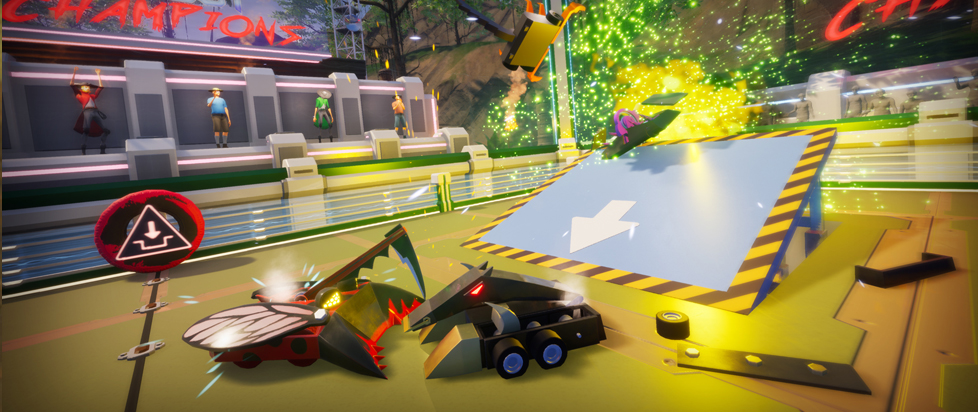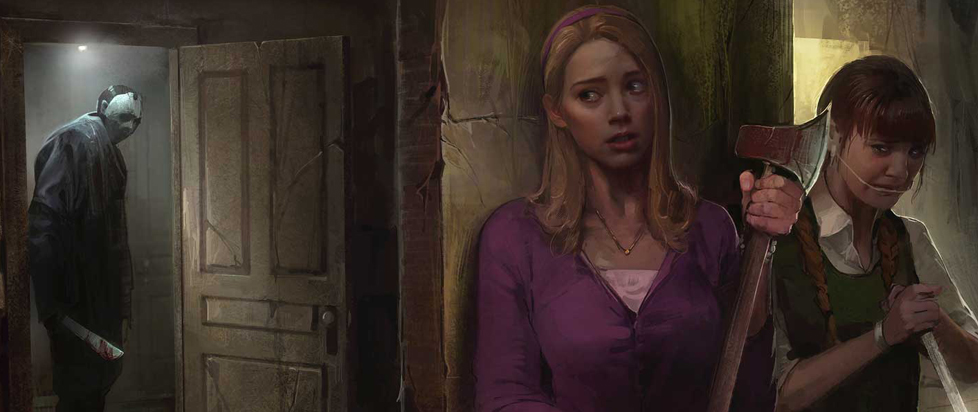
Robot Champions: Fight! For Your Life!
This column is a reprint from Unwinnable Monthly #132. If you like what you see, grab the magazine for less than ten dollars, or subscribe and get all future magazines for half price.
———
This series of articles is made possible through the generous sponsorship of Epic’s Unreal Engine. While Epic puts us in touch with our subjects, they have no input or approval in the final story.

“Making games is crazy! If you work in the games industry you already have the skills to work in any number of non-gaming professions that will be more stable, pay better and never make you work 12 hours a day, six days a week. It’s one thing to work in this industry and another to think you can start your own business and grow it into something successful.
“All the evidence in the world suggests you’re more likely to fail than succeed and it will cost you everything to experience that. You have to have a couple of screws loose to still press forward in spite of the adversity.”
That’s Andrew Bennison, managing director of Manchester’s Prospect Games.
We seldom have a clear view on how difficult it is to make videogames. Partly this is our own fault – most folks will always suspect that making games isn’t “work” the same way that digging ditches is. Partly this is a perception encouraged by the games industry at large, through the use of non-disclosure agreements and robust PR operations. Whatever the reason, we are poorer for it – for me to get anything out of imagining having to walk a mile in your shoes, I need to have an idea of what the shoes, and the mile, are like. Even though I know, intellectually, that game development is hard work filled with pitfalls (because all work is), if I never hear stories about those challenges, it is always going to seem on some level as if videogames just magically appear out of thin air, fully formed and unstained by blood, sweat or tears.

Robot Champions, though, has soaked in all three, according to Bennison. “It’s been through a roller coaster development,” he said in his initial message to me. “Absolute low was needing to put my life savings into the biz to keep the lights on.”
Prospect started out as a development team in university that moved into modding and eventually incorporated as a studio. With two games shipped – Terrawurm and Unbox: Newbie’s Adventure – the team kept kicking around ideas and prototypes for a new project. The one that stuck was Untitled Robot Combat. “Before you ask,” says Bennison, “this was back in 2016, so way before the goose!”
Robot Champions is essentially what if Smash Bros. but Robot Wars (or, BattleBots, as the robot fighting TV show is known in the US). When they pitched the game to publishers, they found that the indie space had changed while they were working on Unbox. A good prototype wasn’t enough. Having trouble finding traction, Bennison and company started reaching out to developers.
“Our offer was simple,” says Bennison. “We have this great game and need help finishing it. Instead of lending us money, let’s team up and finish it together! If there are any skills gaps that either company can’t fill, we’ll co-fund those. Finally, when the game releases (and makes millions) we’ll split that between us.”

Prospect soon found a talented partner studio and got to work. Then, six months later, it all fell apart. Bennison is understandably circumspect about the details of the split, but insists it had nothing to do with the Robot Champions or the relationship between the studios. “When something bad happens in the industry, from a botched launch to a company falling apart,” says Bennison, “It’s usually attributed to malicious acts and bad actors. In reality, it is often a series of uncontrollable events culminating in an unwinnable situation. This is what happened with our partnership; some very unexpected things happened that no one involved could foresee or control. We all did our best to survive and reduce the damage inflicted as much as possible.”
And there was plenty of damage. When the split happened, Robot Champions was about halfway through development. Most of the staff were gone, those who remained were demoralized and there was no money left to hire more. Robot Champions itself was in an unfinished state with very little documentation, making what existed of the game essentially unusable. On top of that, two other Prospect projects that were reliant on the stability the partnership wound up scuttled. “We were left with this absolute mess,” he says. “It was an intensely painful experience for us to have this wonderful thing torn apart without warning.”
All this happened right before Christmas and while Bennison was sure Prospect could regroup and make Robot Champions a reality, he was rapidly running out of energy as the studio’s driving force. Work on rebuilding the game persisted through 2019. Bennison drew up plans for a Kickstarter, to save both the game and the company, but was burning out. “Everything we’d done before this point paled in comparison to the brutal slog of 2019,” he says. “When you burn out, an exhaustion sets in that can’t be fixed with a good night sleep. It damages you exponentially, until you feel like a shambling husk. Ironically, that comes with a loss of sensation, which allows you to keep going.”
Right before the launch of the Kickstarter, Bennison wound up in the hospital after a health scare. “Your body and mind are incredible, they can be pushed to extreme limits over a lengthy time period with seemingly no repercussions,” he says. “But eventually, the damage catches up with you and when it does, you need to stop, rest and recuperate. Unfortunately Prospect needed the entire team to keep going well beyond their natural limits.”

He came out of the hospital with an all clear, but was under doctor’s orders to avoid stress – something that is next to impossible when running a Kickstarter. “When the doctor told me to stop, I understood how severe my health situation was getting. That didn’t change the fact that Prospect was only going to last a couple more months; it didn’t have time to wait for me to get better. Stopping was the sensible thing to do. Continuing forward was the right thing to do.”
Except, a month later, Prospect canceled the Kickstarter campaign. “We tried to run a Kickstarter with no budget, as if we were still living in 2012,” says Bennison. “You can’t just launch a campaign and expect it to go well, you have to treat it like a product and spend enormous amounts on marketing and outreach to cut through the noise. We did as much as we could without any money and were on track to raising about £30,000, but it wasn’t enough. It was our first Kickstarter and it was done in desperation so in retrospect the writing was on the wall before we started.”
This should have been the end of Prospect and a good number of people were telling Bennison to let it go, but what he calls “Plan Z,” the very last shot at turning things around came through. Bennison is vague as to what Plan Z consists of, but it had provided the funding to properly finish Robot Champions, restructure the business and hire new talent. “We’ve essentially come back from the dead,” he says.
It boggles my mind, honestly, even as someone who runs an independent publication and has made some questionable decisions along the way to keep it afloat. It’s the hospital bit that really throws me. To carry on after that seems reckless. Bennison disagrees. “I view life like climbing a mountain,” counters Bennison. “If you stop moving forward you’ll die from the cold, if you veer off path you’ll die from the fall. Death is always within reach and a rewarding life is always far away. My desire for life prevents me stopping, my instinct keeps me on the right path and my experience tells me when to drop dead weight. The only way I’m going to better myself is heading up the mountain because I have no other choice. I find this mindset immensely freeing.”

Which isn’t to say Bennison learned nothing from his experience with Robot Champions.
“It really put me in my place. My boundless energy helped us achieve so much, but it also enabled me to run from my problems. When you’re exhausted and out of options life becomes bleak and binary. There’s death, life and no more running. I felt myself standing on a precipice, staring into darkness. When I looked back I could see all the mistakes and problems that led me there piled up like a mountain.
“I used to think that you stop situations from controlling you, by controlling the situation. Making this game has taught me that you’re missing the point if you think it’s about control in the first place.
“Does that even make sense?! Figuring out life is an on-going process!”
To be continued…
* * *
You can follow the progress of Robot Champions’ development and play the pre-alpha on Patreon. You can also follow Prospect Games and Andrew Bennison on Twitter.




